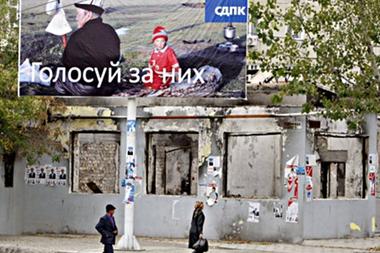
Kyrgyzstan’s Fragile Government and Troublesome Parliament
Publication: Eurasia Daily Monitor Volume: 7 Issue: 221
By:

For several months Kyrgyzstan has existed without a fully-fledged government and functioning parliament. Most voters had hoped to see the government finally formed after three out of five parties represented in the parliament agreed to join the ruling coalition.
It took weeks of negotiations before the Social-Democratic Party of Kyrgyzstan (SDPK) brokered a deal with the Ata-Meken and Respublika parties on December 2. The coalition, however, fell apart the next day when Ata-Meken Party leader, Omurbek Tekebayev, failed to gain enough votes to be elected as the parliamentary speaker, a position he had coveted since becoming a Member of Parliament (MP).
To Ata-Meken’s surprise, several members of the Respublika Party voted against Tekebayev’s candidacy. After the coalition failed, Respublika’s leaders expressed their regrets, but readily accepted President, Roza Otunbayeva’s, decision to take charge over forming another coalition. Respublika’s Deputy Chief, Bakyt Torobayev, said that the party will seek to form a broad coalition consisting of all or four out of five parties represented in parliament (www.akipress.kg, December 6). All five political parties in parliament have agreed to form a special working group that may facilitate the process of forming a coalition (www.akipess.kg, December 6).
Even if the Respublika Party is unable to gather all parties in one coalition, the likelihood that the Ata-Jurt Party will be included in the ruling coalition remains high. Ata-Jurt is infamous for its nationalist views, while most of its members are still loyal supporters of the deposed President, Kurmanbek Bakiyev. Ata-Jurt’s inclusion in the ruling coalition, however, will bridge the gap between the so-called “northern” and “southern” parties, since its main electorate is concentrated in southern Kyrgyzstan.
Whatever the interplay, Respublika’s leader, Omurbek Babanov, will seek the post of prime minister (www.fergana.ru, December 6). Babanov will likely be challenged by SDPK’s Almazbek Atambayev who has been determined to secure the same post. After losing its chance to lead a ruling coalition, the SDPK itself risks finding itself in the opposition, if Atambayev and Babanov fail to reach an agreement.
Meanwhile, Ata-Meken faces a leadership problem, since Tekebayev has become a victim of his own achievements. Tekebayev is the main author of the current constitution that ensures establishing checks and balances within the political system. Tekebayev’s opponents, however, used the process of forming a coalition to marginalize him within the parliament. The leaders of the Ata-Jurt Party and some members of Respublika refuse to recognize Tekebayev’s key role in changing the governance style in Kyrgyzstan (Carnegie Center discussion, December 6).
Respublika will have several weeks to form a new coalition. If the party fails to devise a stable coalition, parliament will have another opportunity before the president will have to announce new parliamentary elections. So far, all parties in the parliament have spoken out against the possibility of new elections. Personal disagreements among MP’s and their inability to agree on key appointments feature among the main reasons for the protracted period of coalition building. The leader of each of the five parties sees himself holding the post of either prime minister or parliamentary speaker. The parties also need to coordinate the informal “north-south” divide and ensure equal representation in government posts. SDPK member, Shamil Atakhanov, said that if a prime minister is a representative of the south, the parliamentary speaker is likely to be from the “north” and vice versa (Carnegie Center discussion, December 6).
Some experts tend to suspect Moscow’s indirect influence over the Kyrgyz parliament’s work. Tekebayev has a reputation as being a pro-Western politician and reportedly Moscow obstructed his bid for the key legislative post. All other parties represented in parliament share strong pro-Russian views. Although Kyrgyzstan today remains a state without a functioning government and parliament, while its judicial system is deeply corrupt, there are grounds for optimism. The prolonged process of coalition building has considerably improved the parliament’s transparency. Voters and mass media are able to observe what guides individual MP’s and their parties during such a process.
The complex process of reaching an agreement on a coalition has also been a steep learning curve for Kyrgyz MP’s, with no experience of functioning in such a transparent environment. If a stable coalition emerges, for the first time in its post-Soviet history Kyrgyzstan might be experiencing elements of deliberative politics. Judging from the past two months, however, a coherent ruling coalition is still a long way off.




